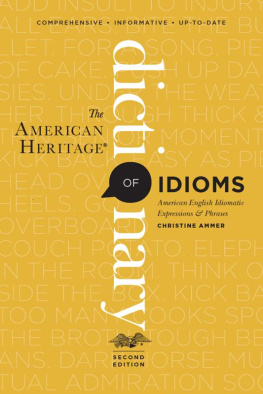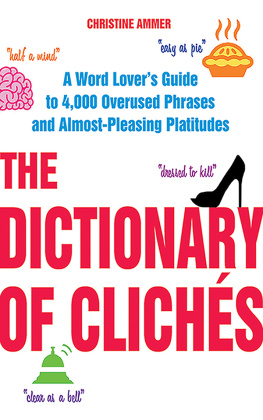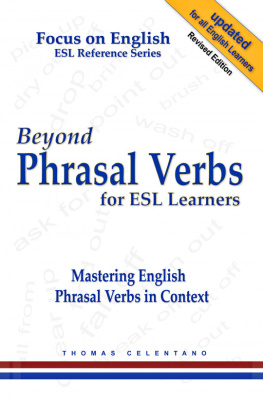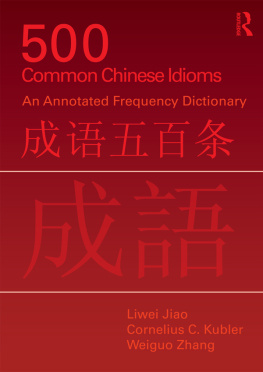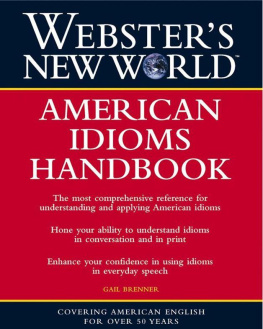Words are included in this dictionary on the basis of their usage. Words that are known to have current trademark registrations are shown with an initial capital and are also identified as trademarks. No investigation has been made of common-law trademark rights in any word, because such investigation is impracticable. The inclusion of any word in this dictionary is not, however, an expression of the publishers opinion as to whether or not it is subject to proprietary rights. Indeed, no definition in this dictionary is to be regarded as affecting the validity of any trademark.
American Heritage and the eagle logo are registered trademarks of American Heritage Inc. Their use is pursuant to a license agreement with American Heritage Inc.
Copyright 2013 by The Christine Ammer 1992 Trust.
No part of this work may be reproduced or transmitted in any form or by any means, electronic or mechanical, including photocopying and recording, or by any information storage or retrieval system without the prior written permission of Houghton Mifflin Harcourt unless such copying is expressly permitted by federal copyright law. Address inquiries to Reference Permissions, Houghton Mifflin Harcourt, 222 Berkeley Street, Boston, MA 02116.
Visit our websites: hmhbooks.com and ahdictionary.com
The Library of Congress has cataloged the print edition as follows:
Ammer, Christine.
The American Heritage dictionary of idioms / Christine Ammer. 2nd ed.
p. cm.
ISBN 978-0-547-67658-6
1. English languageUnited StatesIdiomsDictionaries. 2. English languageUnited StatesTerms and phrases. 3. AmericanismsDictionaries. I. Title.
PE2839.A47 2013
423'.13dc23
2012026443
e ISBN 978-0-547-67753-8
v1.0513
Preface
This book is a comprehensive survey of the idioms currently used in American English. An idiom is a set phrase of two or more words that means something different from the literal meaning of the individual words. For instance, the phrase to change ones tune has nothing to do with music but means to alter ones attitude. Similarly, to hit the nail on the head often has nothing to do with carpentry but means simply to be absolutely right. Idioms are the idiosyncrasies of a language. Often defying the rules of logic, they pose great difficulties for non-native speakers. English abounds with phrases such as if worst comes to worst, far and away, and how do you do, which, if translated literally, make no sense. Indeed, the true test of an idiom is whether it changes meaning when rendered word for word in another language.
In addition to idioms, this book includes common figures of speech, such as dark horse and blind as a bat; interjections and formula phrases, such as all the best and take care; emphatic redundancies whose word order cannot be reversed, such as far and wide and cease and desist; common proverbs, especially ones that often occur in abbreviated form, such as a bird in the hand; colloquialisms such as off the beam and out in left field; and slang phrases such as push the envelope.
Each expression is defined and illustrated by at least one sample sentence showing how it is used in context. In most cases the literal meaning of a phrase is omitted; thus the entry hold up omits the definition keep upright or support. Wherever possible I have included information regarding the expressions origin or background, along with its date of first appearance. I have given approximate dates for most idioms to allow for their probable use in speech before being written down.
The ultimate origin of many idioms is unknown. Some idioms, such as by hook or crook, use familiar words in obscure ways. Some preserve words that are otherwise obsolete, such as hue in hue and cry and fell in in one fell swoop. I have tried to explain these lost origins and obscure meanings whenever research can shed light on them. The result is a dictionary that treats more than 10,000 English expressions in greater detail and depth than any other book available today. I hope that all speakers of English will find it both useful and enjoyable.
Heartfelt thanks are due to the many friends and acquaintances who have offered valuable suggestions, advice, and help, especially my late husband Dean Ammer. Special mention must be made of Steven R. Kleinedler, Executive Editor, and Peter Chipman, Editor, of Houghton Mifflin Harcourt for their assistance with this edition. I would also like to thank Jesse Sheidlower of Oxford University Press for his generous help dating some of the slang expressions. The dictionary has been vastly improved through their assistance.
Christine Ammer
Guide to Using This Book
Entries
All entry phrases and synonymous variants are given in boldface type at the beginning of an entry before the definition. Related or similar expressions are given in boldface in the text of the entry. Historical precedents and obsolete phrases appear in italic type. Where a phrase has more than one meaning, definitions are numbered, and whenever possible, ordered by frequency of use. Example sentences appear in italic type, quotations in roman type within quotation marks, and cross-references in small capitals.
Alphabetization and Cross-References
Entries are arranged alphabetically, letter by letter up to the comma in the case of inverted or appended elements.
To locate an entry, it sometimes may be hard to decide which word in a phrase will come first in the alphabetical listing. For example, is as luck would have it under as or luck? To help sort out these problems, entries listing cross-references for key words appear alphabetically among the main entries. By checking these key-word entries, readers can locate every phrase treated as an entry in this book. The reader who does not find as luck would have it under as can look under the entries beginning with the next word, luck. If more help is needed, the entry for the word luck itself lists all the idioms containing that word which appear elsewhere in the book.
Variants or related expressions that are covered under other entry words appear in parentheses in the cross-references. Thus, at the entry soft the reader is referred to HARD ( SOFT ) SELL , which means that the entry hard sell also treats the phrase soft sell. Note, however, that words in parentheses are not considered part of the alphabetical order, so one should look for hard sell, not hard soft sell.
Variable Pronouns
Many idioms can be used with different pronouns, as, for example, clean up his act, clean up her act, clean up my act. Consequently, the pronouns one and someone are used in entry words and variants to indicate that the object or possessive pronoun in the idiom may vary according to context. One or ones means that the antecedent of the pronoun must be the subject of the clause, or in some cases an inanimate noun or a gerund must be the subject. For example, the idiom hit ones stride can appear in a sentence such as She finally hit her stride, or the idiom serve one right can be used in a sentence such as It serves him right to be thrown off the team. But note that sentences like She finally hit his stride are not possible.
The use of someone or someones in the idiom means that the pronoun can be replaced only by a noun or pronoun that does not refer to the grammatical subject of the clause. In other words, the action of the verb is directed from one person to another (the someone). For example, the idiom
Next page
